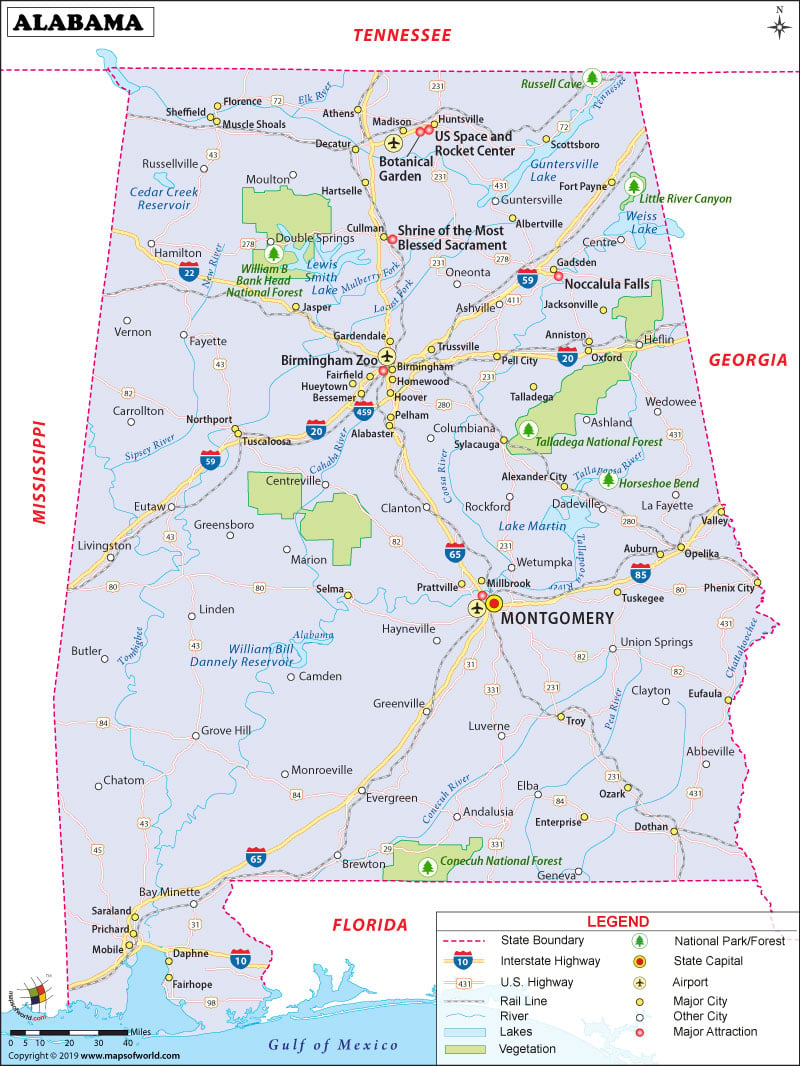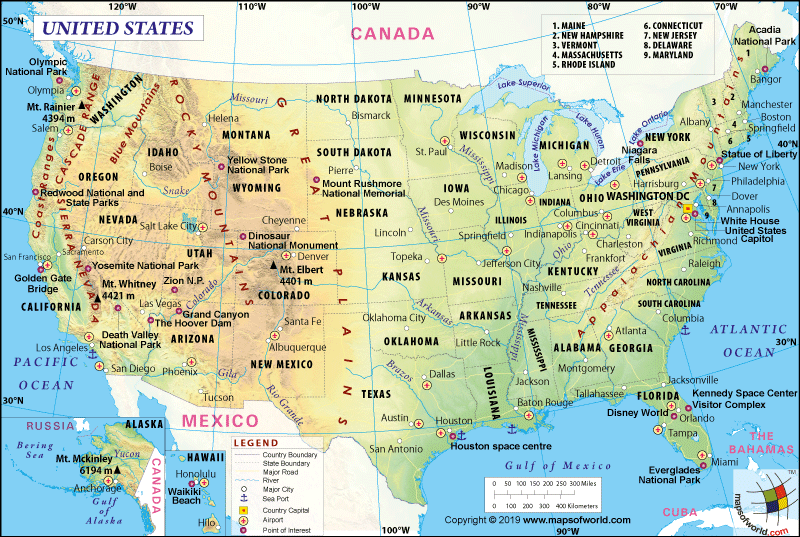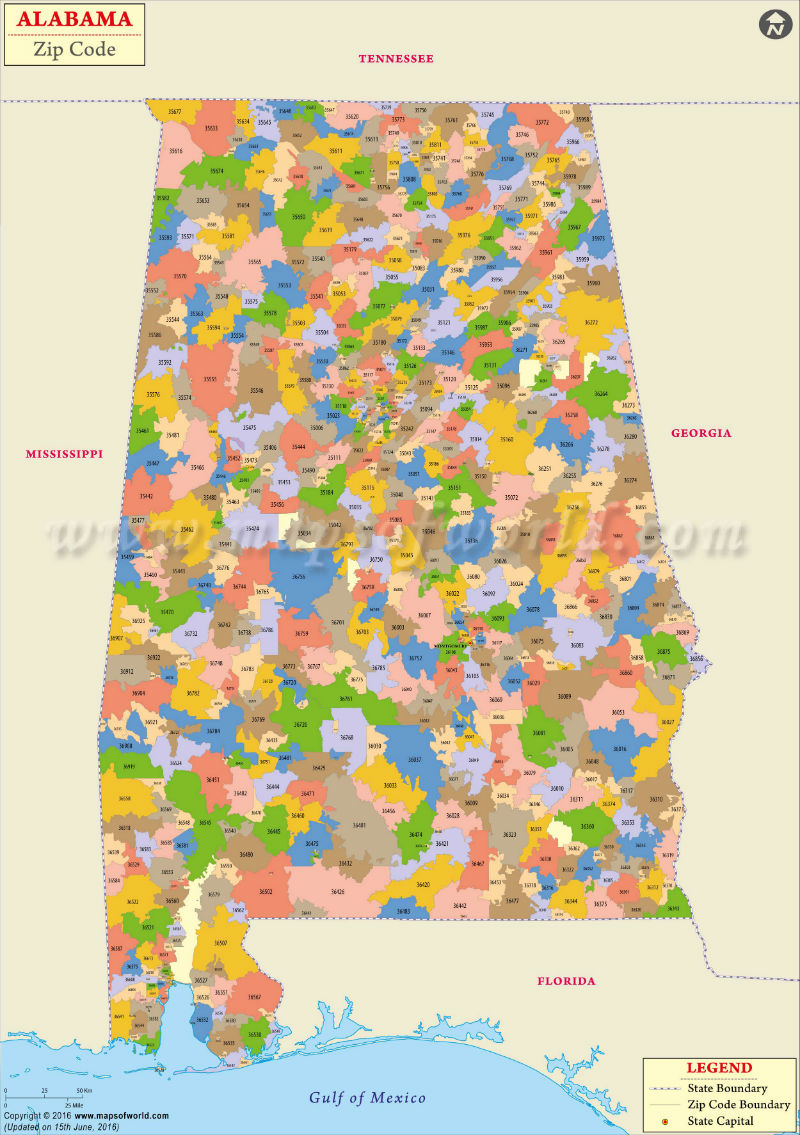What are the Key Facts of Alabama?

|
State |
Alabama |
|
State Capital |
Montgomery |
|
Largest City |
Birmingham |
|
Coordinates |
32.7°N 86.7°W |
|
Nickname(s) |
The Yellowhammer State, The Heart of Dixie |
|
Postal Abbreviation |
AL |
|
Area |
52,419 sq. mi (135,765 sq. km) |
|
Highest Point |
Mount Cheaha, 2,413 ft (735.5 m) |
|
Neighboring States |
Tennessee, Georgia, Florida, Mississippi |
|
Number of Counties |
67 |
|
Population |
4,887,871 (2018) |
|
Date of Entering the Union |
14 December 1819 |
|
State Anthem |
“Alabama“ |
|
Governor |
Kay Ivey (Republican) |
|
Lieutenant Governor |
Will Ainsworth (Republican) |
|
U.S. Senators |
Richard Shelby (Republican), Doug Jones (Democrat) |
|
U.S. House Delegation |
6 Republicans, 1 Democrat |
|
GDP (millions of dollars) |
221,736 |
|
Demonym |
Alabamian |
|
Time Zones |
UTC-06:00 (Central), Summer (DST): UTC-05:00 (CDT). Phenix City: UTC-05:00 (Eastern), Summer (DST): UTC-04:00 (EDT) |
Where is Alabama?
Alabama is located in the USA’s southeastern region. The state shares its border with Tennessee to the north, Mississippi to the west, Georgia to the east, and both Florida and the Gulf of Mexico to the south.
What is the Geography of Alabama?
The state of Alabama is the 30th largest state in the United States of America in terms of area. It is spread across a total area of 135,765 sq. km (52,419 sq. mi), out of which 131,171 sq. km (50,645 sq. mi) is land area and 4,597 sq. km (1,775 sq. mi). This state has 3.2% of the water area.
Over 67% of the total land area (22 million acres equivalent to 89,000 sq km or 34,363 sq mi) is covered by forest. In terms of land and water area, Baldwin County is the largest country of the state and is located along the Gulf Coast. There are 1,350 miles (2,173 km) of navigable rivers in the state. This state has the second-largest inland waterway system in the USA.
Most of the landforms (around 3/5th) here in this state are gentle plain, which gently descends towards the Gulf of Mexico as well as the Mississippi River. Most of the mountainous terrain in the country is located in the northern part. The Tennessee River creates many creeks, mountains, rivers, streams, and lakes. It cuts a large valley. Alabama forms a 60 mi (96.56 km) long coastline along the Gulf of Mexico in the extreme south.
The state’s elevation range varies from more than 1,800 ft (550 m) of the Appalachian Mountains (located in the state’s northeastern region) to the sea level elevation at Mobile Bay. Mount Cheaha is the highest elevation point in this state at 2,413 ft (735 m). The Gulf of Mexico is the lowest elevation point in the state at 0 ft (0 m). The mean elevation of Alabama is 500 ft (150 m).
Major mountains here are Cheaha Mountain, Lookout Mountain, Monte Sano Mountain, Talladega Mountain, Oak Mountain, Taylor Mountain, Sand Mountain, Bald Rock Mountain, etc. Some of the major rivers are Alabama, Mobile, Tennessee, Tombigbee, Conecuh, and Chattahoochee. There are many lakes in the state too such as Guntersville Lake, Lewis Smith Lake, West Point Lake, Lake Martin, and Wilson Lake.
What is the Climate of Alabama?
As per Köppen climate classification, Alabama has a humid subtropical climate, where the average yearly temperature hovers around 18 °C (64 °F). While the northeastern part of the state (where the Appalachian Mountains dominate the landform) has a slightly cooler temperature, the southern part (especially the regions near the Gulf of Mexico) has a warmer climate.
The summers remain hot, and the winters remain mild. During summer, the average high temperature reaches over 32 °C (90 °F) in some parts of Alabama. An abundant rainfall (56 inches or 1,400 mm) along with thunderstorms takes place throughout the year. During the summer as well as spring seasons, hailstorms take place occasionally. Fogs generally occur along the coast. The occurrence of dense fogs is rare. Tropical storms and hurricanes usually take place in the southern parts of this state.
What is the Economy of Alabama?
The total Gross Domestic Product (GDP) for Alabama was US$221,735.5 million in 2018, an increase from US$210,364.4 million in 2017 (as per the US Bureau of Economic Analysis). The economy of Alabama is dependent upon various heavy industries (such as mineral extraction, automobile manufacturing, fabrication, and steel production).
This state has also heavily invested in health care, education, aerospace, and banking. The major employers in Alabama are Redstone Arsenal, the University of Alabama at Birmingham (including UAB Hospital), State of Alabama, Maxwell Air Force Base, and Mobile County Public School System.
The rate of unemployment (seasonally adjusted) in this state was 3.8% in October 2018, which decreased to 3% in September 2019. The state is relatively poorer than the other fifty states, and the median family income remains significantly below the national average. It is the 6th poorest state in the USA. The Poverty Sheet of this state shows that over 800,000 residents of 17.2% of the total population in this state live below the federal poverty line, which is higher than the 14% national average.
What is the Transportation System of Alabama?
Alabama maintains worldwide connectivity with the help of 92 airports, 1,300 miles (2,092 km) of commercially navigable waterways, 3,700 miles (5955 km) of the railway network, six interstate highways, and many more. Huntsville International Airport is one of the busiest international Cargo airports in the United States. The state has over 75,000 miles (120,701 km) of paved public roads, connecting 160 metropolitan areas. Estimates show that 29 million tons of cargo are shipped yearly from the Port of Mobile’s public terminals. There are 16 Freight Railroads and Five Class 1 Railroads.
Why is Alabama called the “Yellowhammer State”, “Heart of Dixie”, or the “Cotton State”?
Alabama is also known as “the Yellowhammer State”, “Heart of Dixie”, and the “Cotton State”. The state is nicknamed after its state bird – Yellowhammer.
In the 19th and the 20th centuries, this state was one of the many cotton-producing states in the country. As it was located in the central position among the southern states (known as Dixie South), the state is known as the “Cotton State”. As many other Southern states could have claimed the same nickname, the Alabama Chamber of Commerce first noted that the state is located in the Heart of Dixie. In 1951, a bill was passed and the phrase “Heart of Dixie” was added to the license plates. It first officially appeared in 1955.
What are the Popular Tourist Attractions in Alabama?
The most popular tourist spots in this state are the US Space and Rocket Center, Civil Rights Memorials of Montgomery, Gulf State Park, USS Alabama Battleship Memorial Park, Birmingham Civil Rights Institute and the Civil Rights Historic District, Mobile Bay, McWane Science Center, Birmingham Zoo, Huntsville Botanical Gardens, Barber Motorsports Park and Museum, etc.
Facts About Alabama
Alabama is the 22nd state of the United States. The capital of the state is Montgomery and the biggest city is Birmingham. The people of Alabama are known as Alabamians. It was admitted to the Union on December 14, 1819. The state gave birth to many famous people. Know all the important Alabama facts and trivia.
1) The Mardi Gras festival was first started by Alabama in the West. The festivities take place on Shrove Tuesday, which is the day prior to the start of Lent.
2) Alabama employees made the first rocket to send man to the moon.
3) In 1886, the oldest Electric Trolley System of the world was launched in Montgomery.
4) Alabama is the sole state in the United States, which houses all the important natural resources necessary to manufacture iron and steel. In addition, the state is the biggest provider of steel pipe and cast iron goods.
5) The capital of Alabama is Montgomery and it is the home-town of the Confederacy of America.
6) In 1861, the first Confederate flag was planned and hoisted in Alabama.
7) Alabama was admitted to the Union on December 14, 1819.
8) The township of Enterprise is home to the Boll Weevil Monument, which recognizes the task of this harmful pest in motivating cultivators to raise harvests excluding cotton.
9) Mobile, Alabama is famous for being the birthplace of the baseball star Henry Louis (Hank) Aaron.
10) Lafayette in Alabama is the birthplace of Joe Louis, the famous heavyweight boxing champion. Louis expired in 1981.
11) The official state song is “Alabama”.
12) Westfield, Alabama is known for being the birthplace of Willie Howard Mays, the famous baseball star.
13) Russell Cave is the place where a skeleton of a primitive man was discovered.
14) With an elevation of 2,405 feet over sea level, the tallest summit of Alabama is the Cheaha Mountain.
15) Huntsville, Alabama is named the rocket capital of the world.
16) The oldest state-sponsored archival bureau in the country is The Alabama Department of Archives.
17) Fort Payne is home to a Museum and Fan Club of the famous musical band Alabama.
18) The first open heart surgery in the Western Hemisphere was carried out by Dr. Luther Leonidas Hill by stitching a knife injury in the heart of a young boy in 1902. This surgery took place in Montgomery.
19) In 1937, Alabama introduced its state sales tax to assist in sponsoring education.
20) Mobile houses famous schools like Huntsville Green Academy (established in 1812) and Washington Academy (established in 1811).
21) From 1817 to 1819, the first provincial capital of the state was Old Saint Stephens.
22) The Army Ballistic Missile Agency was set up in 1956 at Redstone Arsenal, Huntsville.
23) George C. Wallace completed four terms as Governor of the state.
24) Heather Whitestone was first nominated as Miss America in 1995 with a handicap.
25) The geographical core of Alabama lies in Chilton, which is a town situated 12 miles southwest of Clanton.
26) The expression Alabama stands for an ethnic community in the Creek Indian language.
27) Fort McClellan houses the U.S. Army Chemical Corps Museum, which showcases more than 4,000 chemical operation objects.
28) Bessemer is famous for Adolf Hitler’s typewriter, which lived to tell the tale from his mountain hideaway and is displayed at the Hall of History.
29) The formation of Blount County took place on February 7, 1818 and the age of the county is more than the state.
30) The Free State of Winston is another name of the Winston County. It obtained the name at the time of the Civil War.
31) The name of Mobile originated from the Mauvilla Indians.
32) The first psychiatric physician of Alabama was Peter Bryce. Bryce was born in 1834 and passed away in 1892.
33) The Alabama Legislative Assembly approved the Alabama State Flag on February 16, 1895.
34) The official state mineral is Hematite and is called as oxide of iron (Fe2O3).
35) The official insect of the state is the Monarch butterfly (Danaus pleipuss).
36) The official gem of the state is the star blue quartz.
37) The official fair of the state is the Florence Renaissance Faire.
38) The official nut of the state is the pecan.
39) The demonym for Alabama is Alabamian.
40) Alabama was the fourth state to break away from the Union on January 11, 1861.
41) The city of Montgomery was chosen as the capital of the state on January 28, 1846.
42) Between 1930 and 1950, Tallulah Bankhead amused as an idol of movies, theater, and radio. Her hometown was Huntsville and she passed away in 1968.
43) Nat King Cole (Nathaniel Adams), the famous vocalist and performer was called as the man with the velvet voice. His hometown was Montgomery and he expired in 1965.
44) Sequoyah, an inhabitant of the state of Alabama, formulated the phonetic, scripted ABCs of the Iroquoian language.
45) The Birmingham Airport started its operations in 1931. During that inaugural phase, a flight from Birmingham to Los Angeles required 19 hours time.
46) The mean altitude of the state is 500 feet at its lowest altitude point.
47) The official state slogan is Audemus jura nostra defendere. It stands for “we dare defend our rights”.
48) The oldest county in the state is the Washington County.
49) In 1814, General Andrew Jackson overpowered the Creek Indians. After this incident, the indigenous Americans surrendered almost 50% of the current state territory to the U.S.
50) Admiral David Farragut came out with his well-known order at the Conflict of Mobile Bay, “Damn the torpedoes, full speed ahead”. This happened on August 5, 1864.
Related Links:




![]()
